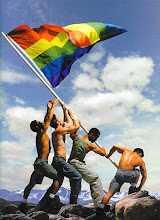
Punitive laws thwart fight against HIV in homosexual men in Asia-Pacific – UN
21 July 2010 – The continued criminalization of male-to-male sex in the Asia-Pacific, resulting in harassment and other human rights violations, is hurting the region’s response to HIV, a new United Nations Development Programme has found. Of the 48 countries in the region, 19 of them – including Afghanistan, Bhutan, Kiribati and Malaysia – have outlawed sex between consenting male adults, with these laws often used by vigilantes in ways that lead to abuse and rights violations.The new report notes that police selectively target men who have sex with men (MSM) and transgender people, leading to assault, extortion and detention in some Asia-Pacific countries with repressive legal environments.
It said that police harassment of outreach workers, many of whom are themselves are MSM or transgender, interrupt HIV prevention services.
Police often raid events where HIV education takes place and censor materials containing information on the epidemic, UNDP said, while laws banning sodomy discourage the formation of support groups, which are vital for effective peer-based HIV prevention, care and support.
HIV prevalence among this group is significantly higher that it is in the general adult population in Asia, it noted, warning that nearly half of all new infections will be among MSM by 2020 unless prevention efforts receive a boost.
Nearly half of the countries in the Asia-Pacific identify MSM as being most at risk in their HIV programmes, even though some of their legal environments remain repressive.
“Legislation and law enforcement often lags behind national HIV policy, with the result that the reach and effectiveness of programmes for MSM and transgender people are limited,” the report found.
It also pointed to the multiple forms of stigma that they confront in most of the region, including discrimination in accessing health care, education, employment and justice.
UNDP did note some positive developments in the region, with eight jurisdictions now recognizing that some constitutional protections extend to sexual minorities.
In Nepal, for example, the Supreme Court has interpreted the interim constitution as guaranteeing equal rights to people regardless of sexual orientation or gender identity. The Government is also considering proposals to introduce wide-ranging legal protections from discrimination regarding sexuality as it drafts its new constitution.
“However, these are exceptional developments,” UNDP said. “Examples of high-level political action and law reform to introduce enabling legal environments for MSM and transgender people are rare.”
Among the new report’s recommendations are the repealing of laws criminalizing sex between consenting adults, as well as supporting community-based education and advocacy on the human rights of MSM and transgender people.
It also calls for anti-discrimination laws to be enacted across the region in relation to sexual orientation and transgender status.









No comments:
Post a Comment